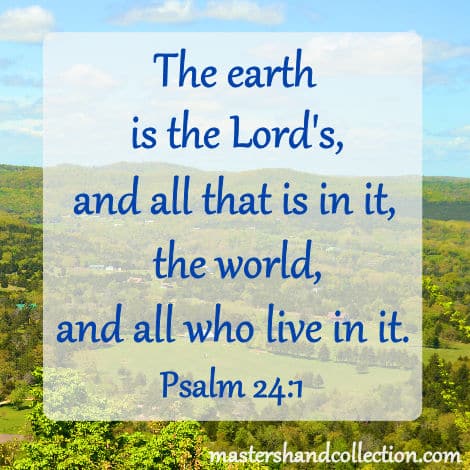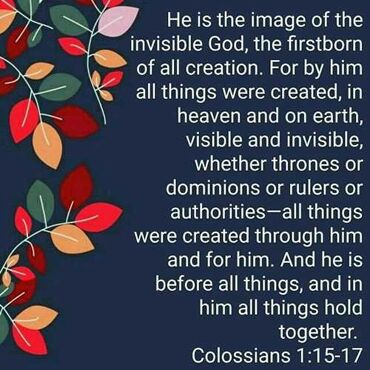Imagine waking up on a crisp morning, the air filled with birdsong, the sun warming your face. You step outside and are greeted by a tapestry of green leaves, vibrant wildflowers, and the gentle rhythm of a nearby stream. In this moment, you feel a profound sense of peace, a deep connection to something far bigger than yourself. It’s this feeling – a shared connection to the beauty and wonder of God’s creation – that Earth Day is meant to celebrate.

Image: mastershandcollection.com
For generations, humans have looked to the Bible for guidance and inspiration. And within its pages lie powerful words that remind us of our sacred responsibility to care for the Earth, God’s gift to us. By exploring these verses, we can gain a deeper understanding of our role as stewards of this planet, and find renewed purpose in our commitment to environmental protection.
A Tapestry of Creation: Recognizing God’s Masterpiece
The Bible’s opening verses, in the book of Genesis, set the stage for our relationship with nature. God, the ultimate creator, fashioned the heavens and the Earth, painting the landscape with breathtaking detail. In Genesis 1:1, we read, “In the beginning, God created the heavens and the earth,” a declaration of God’s absolute power and the divine origin of all that exists.
From the majestic mountains to the delicate wildflowers, there’s a sense of awe and reverence that pervades the account of creation. God’s intention wasn’t simply to create, but to create something beautiful, something to be cherished and protected. In Genesis 1:26, God declares, “Let us make man in our image, in our likeness, and let them rule over the fish of the sea and the birds of the air, over the livestock, over all the earth, and over all the creatures that move along the ground.” This verse speaks of God’s entrustment, of our responsibility as caretakers of His creation.
The Garden of Eden: A Symbol of Harmony
The story of the Garden of Eden, found in Genesis 2, offers another profound insight into our relationship with the earth. In this pristine paradise, humans lived in perfect harmony with nature, nourished by the land and surrounded by its beauty. However, with the fall of humanity, a rift emerged, breaking the balance of Eden and ushering in the challenges of our present world.
The garden’s story is a timeless reminder of the devastating consequences of neglecting this sacred trust. It teaches us that our actions have a ripple effect, influencing the delicate balance of nature. The garden’s transformation from a state of perfect harmony to one marred by hardship serves as a poignant reminder of the need for responsible stewardship.
Wisdom from the Psalms: Finding Joy in God’s Creation
The book of Psalms, a collection of poetry celebrating God’s greatness, offers numerous verses that spark our appreciation for the natural world. In Psalm 104:24, David, the psalmist, exudes a sense of wonder, proclaiming “How many are your works, Lord! In wisdom you made them all; the earth is full of your creatures.” This verse emphasizes the sheer diversity and complexity of God’s creation, invoking a sense of awe and gratitude for the abundance that surrounds us.
Other verses, like Psalm 8:3-4, invite us to contemplate the grandeur of the starry sky, prompting us to ponder our place within this vast and intricate cosmos. “When I consider your heavens, the work of your fingers, the moon and the stars, which you have set in place, what is mankind that you are mindful of them, human beings that you care for them?” This introspective reflection reminds us of our interconnectedness with the natural world and our responsibility to care for it.

Image: bibilium.com
A Prophetic Warning: The Consequences of Neglect
While the Bible celebrates God’s creation, it also warns against the dangers of neglecting it. Isaiah 24:5 lays bare the consequences of ignoring God’s commands: “The earth is defiled by its inhabitants, because they have transgressed the laws, violated the statutes, broken the everlasting covenant.” This verse points to the destructive impact of human activities on the environment, highlighting the need for responsible action.
Other verses, like Revelation 11:18, paint a vivid picture of the far-reaching consequences of our choices. “The nations were angry, and your wrath has come. The time has come for judging the dead, and for rewarding your servants the prophets and your saints and all who fear your name, both small and great.” These words serve as a stark reminder that our choices have a profound impact, not only on our present but on our future.
A Call to Action: Becoming Responsible Stewards
The Bible’s message about the Earth isn’t just about appreciation; it’s about action. It inspires us to be responsible stewards of God’s creation, not simply consumers of its resources. In Genesis 2:15, God instructs Adam, “The Lord God took the man and put him in the Garden of Eden to work it and take care of it.” This verse highlights our duty to care for the Earth, to cultivate and protect it for generations to come.
The book of Proverbs offers valuable wisdom when it comes to environmental stewardship. Proverbs 11:21 reminds us, “Whoever is righteous will be rewarded, but whoever is treacherous will be destroyed.” This verse suggests that our actions have consequences, that our choices have an impact on the delicate balance of our world. Living in harmony with nature, respecting its limits, and making sustainable choices becomes not merely an ethical act, but a practical one.
Bible Verses For Earth Day
Embracing a Sustainable Future: Investing in God’s Creation
Whether we are planting trees, conserving water, advocating for renewable energy sources, or simply appreciating the beauty of nature, every action we take in alignment with God’s principles makes a difference. Protecting the environment becomes an act of worship, a way to express our gratitude to the Creator and our commitment to a sustainable future.
The Earth is a gift from God, a magnificent tapestry woven with intricate detail. By immersing ourselves in the Bible’s verses about nature, we can gain a deeper understanding of our role as stewards and find renewed inspiration to protect and preserve this precious gift for future generations.






